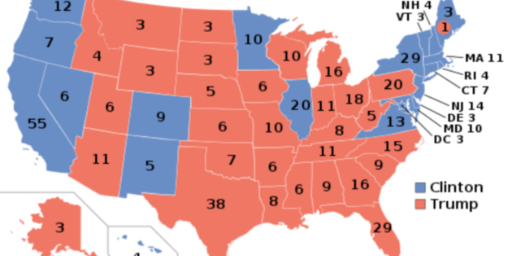Not Our Forefathers’ Electoral College
Over the past few months I’ve been reading about the “ingenious” solution to do away with the electoral college without amending the constitution: By having states enter into a compact that insures they will allocate their electoral votes to the winner of the popular vote. There are several reasons to object to this effort, but first some details courtesy of CBS:
Not Our Forefathers’ Electoral College, States Hatch Plan To Insure That Popular Vote Winner Becomes President – CBS News
Advocates hope to put the legislation before every state by 2007, says Mr. Ritchie.Meanwhile, several newspapers have come out in favor of the plan, including The New York Times, which calls it an “ingenious solution.”
But in California, GOP Assemblyman Chuck DeVore derisively refers to the proposal as a way to “amend the Constitution without amending the Constitution.”“It’s like cheating,” says Mr. DeVore, who predicts that the plan would force candidates to campaign primarily in urban areas with large populations to win the popular vote.
Under the current system “we discourage regional candidacies and basically force people who are running for president to have a message that resonates with the vast middle of America,” he says.
DeVore supports a system that would allocate some of a state’s electoral votes based on the popular vote in congressional districts, an approach that exists in Nebraska and Maine. All other states and the District of Columbia award all their electoral votes to the presidential candidate who gets the most votes in their state.
It takes 270 electoral votes out of 538 total votes in the college to win the presidency. That total equals the number of members each state has in both houses of Congress, with the District of Columbia getting three of its own.
The electoral college system is “distinctly American,” says Shaun Bowler, a political scientist at the University of California, Riverside.
But the proposed system would have another idiosyncrasy: Electors, typically faithful party members, could be forced to cast votes for the opposing party. “You’ll be asking dyed-in-the-wool Democrats to vote for Republicans, and that’s not going to go down well,” Mr. Bowler says.
In U.S. history, there have been about 700 failed proposals in Congress to change the electoral college system, according to the Office of the Federal Register.“It’s safe to say that there has been no aspect of what the founders worked up in Philadelphia that has received more criticism than the electoral college,” says historian Rick Shenkman of George Mason University.
If any state approves this new proposal, legal challenges are inevitable, Bowler says.
But he figures there might be a way to dampen enthusiasm. “You could say the French elect their president directly,” he says. “I’m thinking that will get people running away from any support: If the French do it, is it really right for the U.S.?”
Off the top of my head, I can think of at least one reason why this might be unconstitutional: The supporters apparently don’t intend to get Congress’s approval of this pact. Article 1, Section 10 of the Constitution:
No State shall, without the Consent of Congress, lay any duty of Tonnage, keep Troops, or Ships of War in time of Peace, enter into any Agreement or Compact with another State, or with a foreign Power, or engage in War, unless actually invaded, or in such imminent Danger as will not admit of delay.
I suspect the courts will knock this pact down on those, or other, grounds.
I’m probably one of the 10% in the country who is actually a fan of the electoral college because it mirrors our system of government and circumscribes the weight of the voters in large populations centers. However, I would like to see the following changes:
- Copy the way Maine and Nebraska allocate electors, with the winner of the State getting two electoral votes, and the winner of the individual Congressional districts getting one vote if they win that.
- Use Instant Runoff Voting to ensure that the winner gets a clear majority of votes within the state and districts.
That’s all I can think of at the moment.
Allocating the electors as described would keep the Parties from becoming too regional and would give Republicans a reason to campaign in New England and the Democrats a reason to campaign in the South. They would be able to get votes from there. This would need to be done on a state-by-state basis and could be done through a compact if they received a Congressional mandate.
Related: Abolishing the Electoral College by Stealth (James Joyner).






Robert,
I see you made the Art I., Sec. 10 argument in the comments of my posting on this issue back in April. I missed it.
This isn’t a provision I’ve studied. FindLaw’s Annotated Constitution (which shows how the courts have “amended” the Constitution over the years) says only this about that section:
I know states enter into agreements with one another all the time, such as Alabama-Florida-Georgia over river use and Virginia-DC-Maryland over various transportation issues. I don’t know whether they have to be ratified by Congress.
Americans cannot deal with ambiguity
I still think it’s hilarious that California has even considered signing onto this scheme — which would have awarded their 55 electoral votes to George W. Bush in 2004, contrary to — what, sixty percent? — of California voters’ express wishes at the ballot box.
James,
Good point. I was taking the text of the Constitution literally. There could be some early history, back when the States were much more independent, that prevented the feds from trying to implement this as written. It could also be that many of the compacts that the states enter into are not enforcable in federal court because Congress didn’t approve; they just trust one another to abide by the agreement. Most compacts would seem to fit in this area since they are mutually beneficial and both parties agree that that’s the case.
Or the NPV people could be right that it doesn’t need any type of authorization in Congress. I still find the NPV more than a little appalling.
The “instant runoff” would be a big boon to third parties. Now, unless you are a Vermont socialist, a third party candidate vote is likely to be meaningless. I suspect that the Greens and the Libertarians would be the most immediate winners. But such a change would have to come from a legislature dominated by either republicans or democrats. Neither party is likely to give a helping hand to third parties.
The elector by congressional district is an interesting issue. On the one hand it can be argued to be closer to the intent of the electoral college. You have two electors selected by state wide vote (your senate equivalents) and the rest by congressional districts. Gerrymandering could be a big issue. For a state like California, it would be a reduction in importance. Instead of a massive 55 votes, it would probably go 35 to 20 (representing the current senate/house make up). So in the race to 270 (or 269 if you control the most states in the house) you would see California change from a major swing factor (20% of the total needed) to being a net 15 for the dems. Texas would likely go 23 to 11 (same reasoning) for a change from 34 votes to a net 12 votes.
Now ask yourself how likely the republican controlled Texas state legislature or the democratic controlled California state legislature would want to see the other party pick up 11 or 20 electoral college votes respectively. Just for a minute imagine 2000 when such a shift would have moved the entire election (towards the other camp). Not a pretty picture for a party loyalist on either side.
So I don’t see any of these ideas happening any time soon. To much vested interest on the part of the existing two parties. The popular vote total idea would likely fail for similar reason plus the individual electors. No matter what the “state agreement”, I can’t see partisan electors not ignoring the agreement and voting for their “party” in a close election.